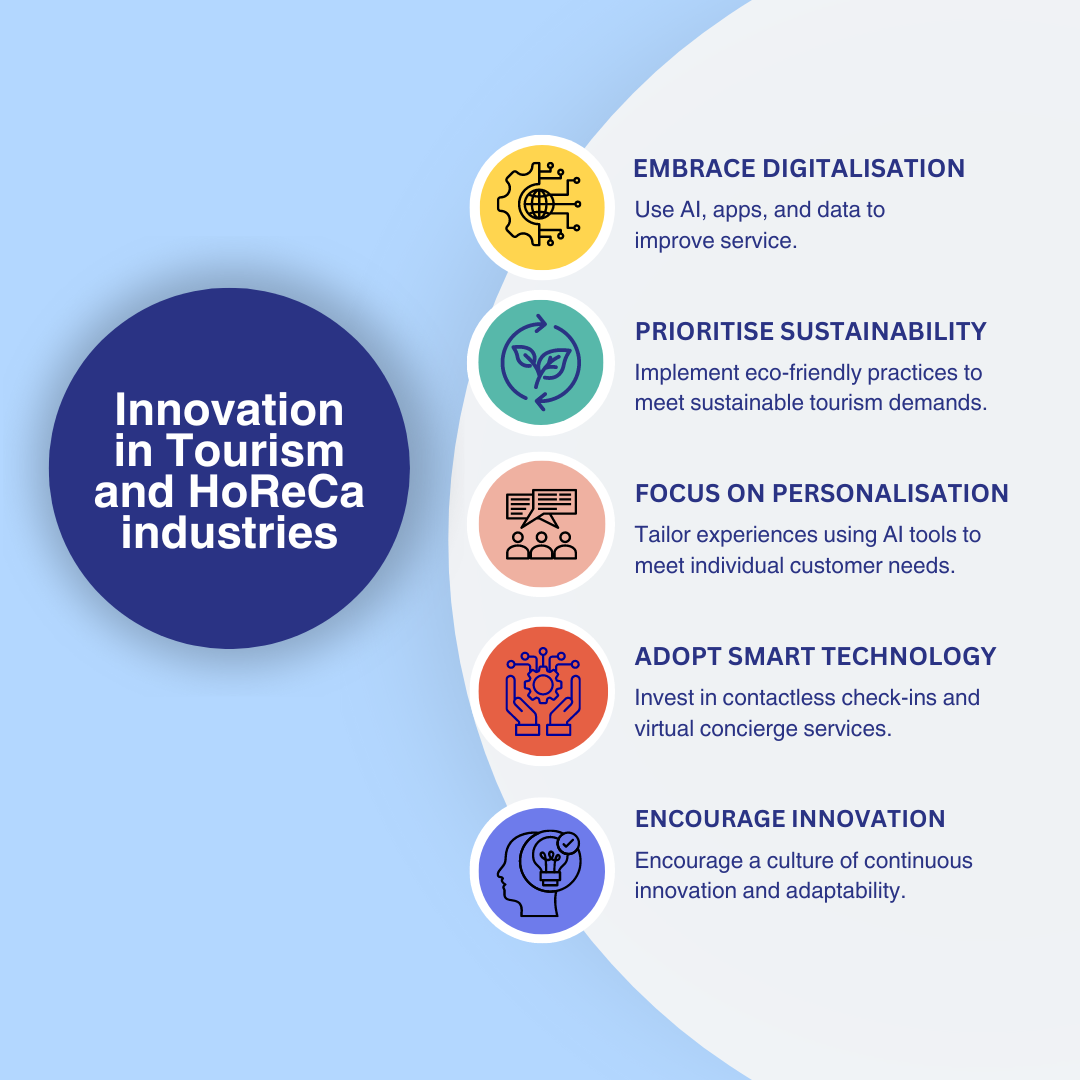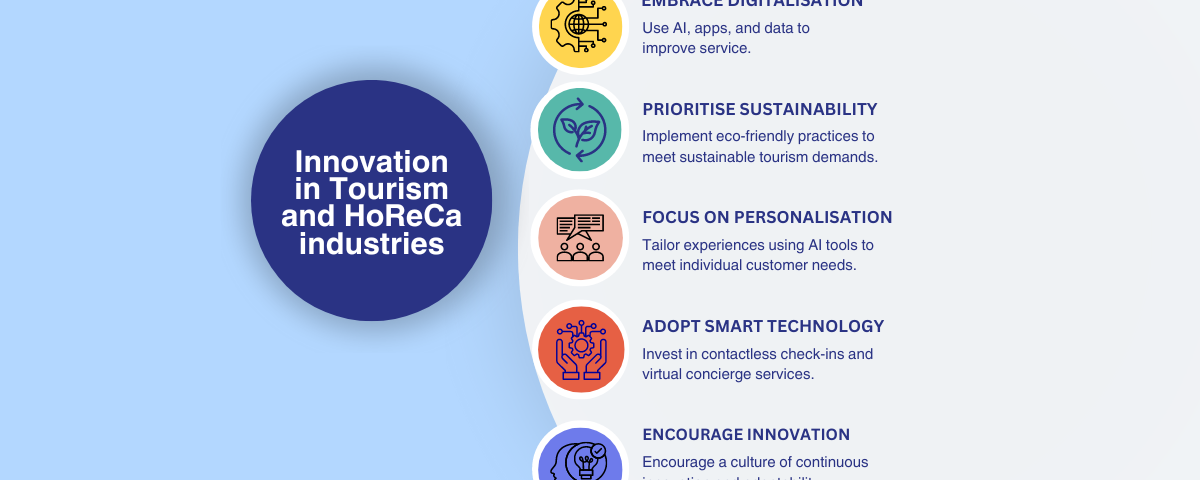
The Academic and Cultural Benefits of Studying in Germany: A Guide for eiIET Applicants
September 8, 2024
Navigating the HoReCa Industry with EIIET: Why an Executive MBA Matters
September 22, 2024The Role of Innovation in Tourism and HoReCa: How to Stay Competitive in a Rapidly Changing Industry
With the rapid development in the global market, tourism and HoReCa (Hotel, Restaurant, and Catering) are changing fast. They are among the most prominent global industries, continuously improving with new trends and consumer preferences. Innovation in tourism and HoReCa is essential for any industry that wants to distinguish itself from the rigorous competition. Technical development, consumers' preferences, and other concerns for a more sustainable environment—all these topics caused significant changes among businesses operating in this particular industry. The growing competition in these industries requires active participation and commitment to constant innovation in order to succeed.
The following article highlights the role of innovation in tourism and HoReCa, presenting valuable information for companies seeking success within such a fast-moving environment.
The Need for Innovation in Tourism and HoReCa
Innovation in the tourism and HoReCa industries has always been an excellent factor for success. It is one of the main factors contributing to many countries' economic growth. As a result, these industries have always been at the forefront of innovation, which can be accomplished technologically and by changing the tourism experience through different packages and treatments. Tourism and hospitality heavily rely on consumer satisfaction, and the power to innovate ensures that businesses can meet customers' expectations. Three key factors create the background that requires constant innovation within the tourism and HoReCa industries:
Change in Consumer Preferences
Today, both guests and diners are better educated, techno-savvy, and seeking experiences more than anything else. Personalisation, convenience, and unique experiences maintain the top of the requested features. Innovation plays a crucial role in addressing these evolving consumer preferences. For instance, technology can provide personalised recommendations based on past behaviour or create customised experiences that cater to specific preferences. Today's travellers don't just go to see the sights anymore. They're looking for meaningful, truly cultural experiences. Similarly, restaurant and hotel guests need a seamless, personalised stay quality with sustainability at the forefront.
Technological Disruption
The growth of digital technologies changed the face of tourism and the HoReCa industry. Mobile applications, AI-driven customer services, and data analytics are only some features that continue changing how business is carried out. If the company is to be competitive, it has to adapt to up-to-date technology. This helps make the operation efficient for an enhanced customer experience and to control the bottom line.
Sustainability and Social Responsibility
Increased pressure is put on tourism or HoReCa industries to make their practices sustainable and socially responsible. Because consumers become more sensitive to the environment, businesses that practice sustainability have an advantage over others. This positively contributes to international efforts towards ecological conservation and social interaction with communities.
Key Areas of Innovation in Tourism and HoReCa
Innovation within the tourism and HoReCa industries can be of all types, from technological breakouts to sustainable initiatives. Below is the list of primary areas wherein innovation was acting as a driving force:
1. Digital Transformation and Technology Integration
Technology has anchored almost all aspects of the tourism and HoReCa industries. Below are some examples of how technology inspires innovation:
Mobile and Applications: Today, travellers want to do all travel-related activities through mobile applications. It means everything from flight and accommodation bookings to ordering in-service or checking into a hotel without interacting with the front desk—all on account of mobile apps that allow seamless customer experiences. For example, mobile apps can provide a streamlined booking process or offer in-app services that enhance the guest experience. Similarly, AI and chatbots can provide round-the-clock customer support or make personalised recommendations based on customer data.
AI and Chatbots: AI-driven chatbots are enabling better customer support by providing services like query resolution, reservations, and problem-solving on a 24*7 basis. These also use customer data to make recommendations for enhancing the customer experience.
Big Data and Predictive Analytics: The tourism and hospitality businesses have increased the use of big data to analyse customer behaviour, predict trends, and improve services. All this is driven by a data-driven approach that enables personalised marketing to make better decisions regarding service offerings and pricing strategies.

Virtual Reality and Augmented Reality: Virtual tours and other immersive experiences through VR and AR allow customers to preview destinations, hotels, and restaurants before they decide. This virtual preview gives them an idea of what experience they will have once booked. During the COVID-19 pandemic, certain companies even gave travellers a taste of being abroad using virtual reality. Many locations worldwide offered online guided tours around beautiful islands and locations to people during the pandemic for those at home to join. Although this was a solution to a particular problem, virtual reality will continue to be applied so that those without the capability or means to travel to new places can still experience them from their homes.
2. Sustainable Practices and Eco-Innovation
Eco-friendly and sustainable tourism and hospitality options are fast emerging as one of the fastest-growing segments in demand. For this reason, businesses have embraced sustainable operations practices that include:
Energy Efficiency: Most hotel industries and restaurants now take environmentally friendly steps towards energy-efficient appliances, lighting, and building designs to reduce their carbon footprint. Solar panels, smart thermostats, and energy-efficient HVAC systems are fast becoming industry standards.
Food Waste Reduction and Single-Use Plastics: HoReCa is innovative in minimising food waste and single-use plastics. Some restaurants accomplish this with an investment in AI tracking and waste reduction, while hotels cleared their supply of single-use toiletries, replacing them with eco-friendly alternatives.
Green Certifications: Reducing carbon footprint through green certifications, such as LEED-accordant buildings or in cooperation with eco-labels, endows companies with marketing advantages and reassures clients of their ethical concern for the environment.
3. Personalisation and Customer Experience Enhancement
Personalisation has become one of the essential factors for customer satisfaction. Whether guests stay in hotels, dine in restaurants, or take guided tours, they now get accustomed to services according to their preferences. Some of the innovations in this direction include:
AI-powered personalisation: AI has changed how industries engage with customers by providing them with customised experiences. Industries utilise the data collected through past bookings, preferences, and behaviour to recommend trips, dining, or hotel stays. These tailored suggestions enhance customer satisfaction by making suggestions based on individual preferences, travel history, and even predicted future requirements.
Customised experiences: Many travel companies and hotels design packages based on the customer's preferences. The packages may include adventure, wellness, or cultural experiences that promise unique and memorable stays.
Immersive Dinner and Stay Options: Chef's table dinners or even menus on an iPad redefine the dining experience. In hotels, guests can tailor everything from the pillows on their bed to the ambient room temperature.
How to Stay Competitive: Embracing a Culture of Continuous Innovation.
Tourism and HoReCa businesses must implement continuous innovation as a critical aspect in keeping themselves competitive. Adopting a culture of constant innovation may have a number of advantages, such as increased operational effectiveness, better customer satisfaction, and a competitive advantage. New innovative projects can come from things such as Environmental Performance Certificates, Environmental Management Plans, and the participation of employees in a variety of green activities; these projects can only offer a fresh breath of air to those eco-conscious consumers who are not willing to visit other destinations that might not meet their green expectations.
- Innovate with technology: Companies will continue to be competitive and productive by utilising and investing in new technologies. AI integration, big data, and other high-end digital solutions are essential for a cheaper and safer operation, as they can decrease the need for manual labour and increase the average individual mobile user's control over their journey.
- Going eco-friendly: Introducing eco-friendly products and services will likely attract sustainable-conscious consumers. Successful environmental footprints of companies can be the primary factor determining the success of their eco-sustainable interactivity with customers. Furthermore, it is seen as a win-win situation as the company contributes to environmental sustainability and gets the advantage of decreased running costs and improved branding.
- Personalisation Enhancement: The customer experience should lie at the heart of every innovation strategy. Data usage will ensure that personalisation extends from booking into the room and keeps customers loyal, making businesses stand ahead of the competition.
- Nurture a creative culture: Innovative ideas come from every level, like brainstorming sessions, workshops, and incentive programmes that foster innovation. Creativity leads to continuous improvement and adaptability in the environment. Cultures that embrace creativity nurture a mindset for constant development and adaptability among employees.
The European Institute of Innovation, Entrepreneurship, and Technology (EIIET) offers specialised B.A. and M.A. in Tourism and Recreation and Executive MBA in HoReCa programmes that equip our students with the skills necessary to lead and navigate in this quickly evolving field. EIIET provides a comprehensive guide to how to meet these challenges head-on and ensures that our graduates are well-equipped with knowledge to succeed in this competitive field.

